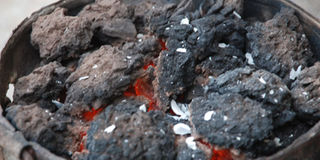Six ways to make your home green

Geofrey Okello is a 47 year old father of five , who pays an energy bill of more than Shs230,000 every month. He pays a monthly electricity bill of at least Shs100,000 every month(though this normaly shoots up during the holidays when all his children are at home). He buys at least a sack of charcoal at Shs70,000 monthly and re-fills the cooking gas cylinder at atleast Shs50,000 every month. This translates to roughly Shs2.8m per year.
The trouble with this amount is that it is really high. But that is not all. It is wasteful especially as there are alternatives. Cheaper and energy efficient ones at that. Being responsible global citizen means that one should do good to the environment right from their home.
Do something good for your family, your pocketbook, and the environment by making your home a little greener. A few simple changes in your house can go a long way to combat both high energy bills and global warming. To be green, you have got to be energy efficient and careful about the environment.
1. Change the light bulbs
Daniel Luyimba of Ssebagala and Sons says the amount of energy that a household can save when they make the decision to use fluorescent lighting over the regular type of light bulbs is unbelievable. “As a matter of fact, just the use of one 5 watt fluorescent light bulb only uses one-quarter the amount of energy that is required when a regular 14 watt light bulb is used.” One of the reasons that so much energy can be saved when homeowners use fluorescent lighting is fluorescent bulbs only use very small amounts of mercury. Additional tips to save energy include the installation of dimmer switches and timers.
2. Cooking with briquettes
A bag of charcoal currently costs between Shs70,000 to Shs100,000. This bag of charcoal is used up in under a month. There is an easier, cheaper and more effective way of cooking though. According to Dorothy Migadde, an artist, who has been making briquettes for her own home consumption, charcoal briquettes are charcoal dust compactly massed by a binder of soil, cassava flour, corn or sweet potato starch. Charcoal is not like clay.
As fuel, charcoal briquettes have higher heating value than wood or plain charcoal. They are almost smokeless when burning and give off intense and steady heat. “The briquette are much cheaper, environment friendly, last twice as long as charcoal and even burn really hotter than normal charcoal. Just a stove-ful and a half of briquettes are enough to cook a meal,” Migadde says.
How to make briquettes
Get char powder, mix it with soil, make fist-sized balls out of the mixture and let them dry for at least three days and just like that, you will have your own briquettes. This is the simplest way to make the briquettes.
“The beauty about the briquettes is they cost almost nothing to make. You can get char powder for free from any charcoal seller.(char powder are the powder remains after solid charcoal has been sold, or the dusty remains of charcoal in the sack after you use up all the charcoal). Many enterprising traders sell a sack of char powder at least Shs3,000 to Shs5,000.” Migadde says.
All you need is a little determination and skill to commit to making your own briquettes. According to Midadde, no one in Uganda currently sells briquettes, so one has to make them by themselves.
3. Monitor your usage
The basic figures contained within a monthly or quarterly electricity bill do not give you much information as to where your electricity is going - they just tell you how much you have used in total during that period. Therefore it is well worth considering purchasing an electricity usage monitor and using it to see exactly where all your hard-earned money is going. Upgrade to a Umeme’s Yaka metre which helps consumers monitor their electricity usage in their houses.
Umeme has been installing metres free of charge in some parts of Kampala like Luzira,Mutungo and Bbiina. You could check with the Umeme office in your area to find out the cost of getting one in your house.When you understand how you are using your power, it is easier to regulate your consumption.
Turn off your television, charger , radio, and other entertainment devices when they are not being used. You also need to reconsider if you really need to use all those gadgets. Also, fine tune all your equipment, spoilt gadgets consume much more power than those working just fine.
4. Power hybrid
Having a hybrid of solar and electricity is another energy efficient idea, where one installs a small solar power system but still runs other appliances on regular electricity. At Ssebagala and Sons, a solar set that can run a TV set , speakers, six lights and a low voltage flat iron costs at least Shs1.4m. An 80 watts solar panel costs Shs640,000, a 100 AH battery costs 550,000 and a 600watt inverter goes for Shs280,000.
Luyimba advises that it is better to leave the fridge and other high voltage gadgets on regular electricity because for solar to run such gadgets, one would require very high voltage which he says is quite expensive.
So, if a family spends at least Shs100,000 on electricity every month, the solar system would help them save an average of Shs40,000 at least. One will break even in three years and have an assurance of electricity all the time.
5. The sana cooking basket
Made from local insulating materials, this basket can save up to 50 per cent of the fuel/energy you use in your home. Working on a principle similar to that of a pressure cooker, all you have to do is half-cook your food (Irish potatoes, rice, meat, beans) when the sauce pan is covered because the trapped heat is necessary to cook the food to completion. Quickly transfer the pan into the basket and leave it for an appropriate period of time and the food will be hot and ready to eat.
“Other than completing the cooking, this basket also serves to keep your food (even matooke) hot up to a period of four hours saving on your fuel consumption and the task of having to re-warm your food,” Sarah Kyesimira, who makes these baskets says. “You can even put three sets of food, say, meat, rice and Irish potatoes at a go in the basket,” she adds.
The smallest basket costs Shs40,000, while the medium one goes for Shs 60,000. The largest that caters to a family of 10 people goes for Shs 85,000.
They can be found at Uganda Small Scale Industries Association (the USSIA) shop at UMA showground.
6. Use natural cleaners in your home
Most cleaning products fall into one of two categories: toxic(to humans and to the enviroment) or expensive. While both types will clean almost anything, there are natural options, which are not only planet friendly, they are inexpensive, non-toxic and very effective.
There is vinegar, often dubbed as a miracle cleaner. Vinegar actually cleans much like an all-purpose cleaner. All you need is to mix a solution of equal parts of water and vinegar in a spray bottle and you have a solution that will clean most areas of your home.
For example in the bathroom and bathroom, clean the bathtub, toilet, sink, and counter-tops. Use pure vinegar in the toilet bowl to get rid of unsightly rings. Flush the toilet to allow the water level to go down before pouring the undiluted vinegar around the inside of the rim. Scrub down the bowl.
You can also mop the floor in the bathroom with a vinegar/water solution. Vinegar will also eat away the soap scum and hard water stains on your fixtures and tiles leaving them shiny and beautiful. A 500ml bottle of vinegar costs around Shs5,000
Lemon juice is even a much more readily available natural cleaner. High in citric acid, lemon juice one of the best natural cleaners due to its antibacterial properties. Lemons also smell great and aren’t likely to cause damage to materials around what you are cleaning such as fabric or wood.
Examples of how you can use lemon: Clean hard water stains on glass shower doors with half a lemon, remove odours from your refrigerator with a half lemon on a saucer and clean food preparation smells from your hands with a dilute solution of water and lemon juice. One lemon is as cheap as Shs200 at any local market around the country.
Then there is baking soda, a great deodiser. Deodisers remove and disguise, unpleasant smells
One great way to remove stale smells from food containers, is to rinse them out with hot water and baking soda. If the smell persists, let the container soak overnight in the baking soda and water mixture. 250g of baking soda is at at least Shs2,000.




